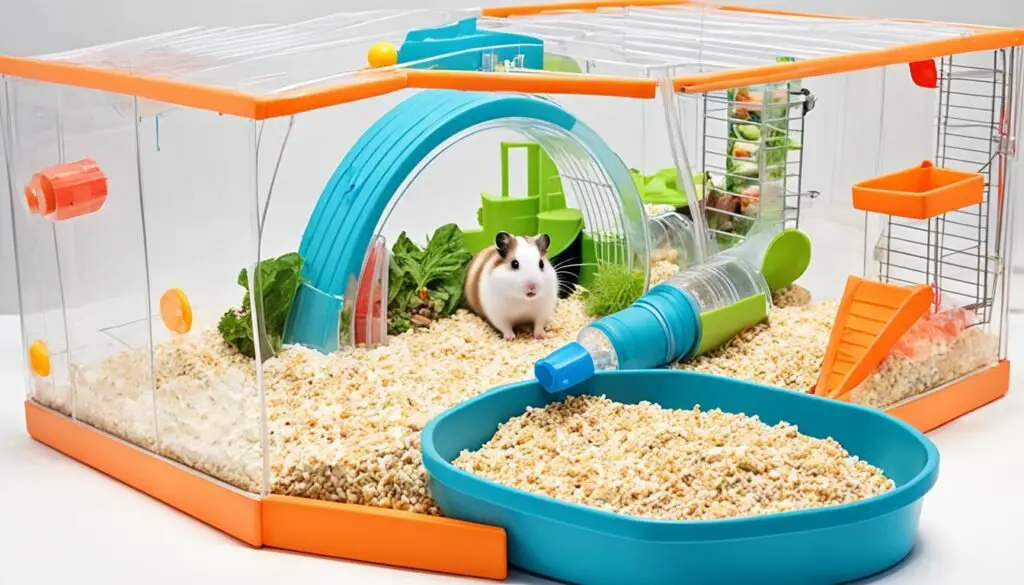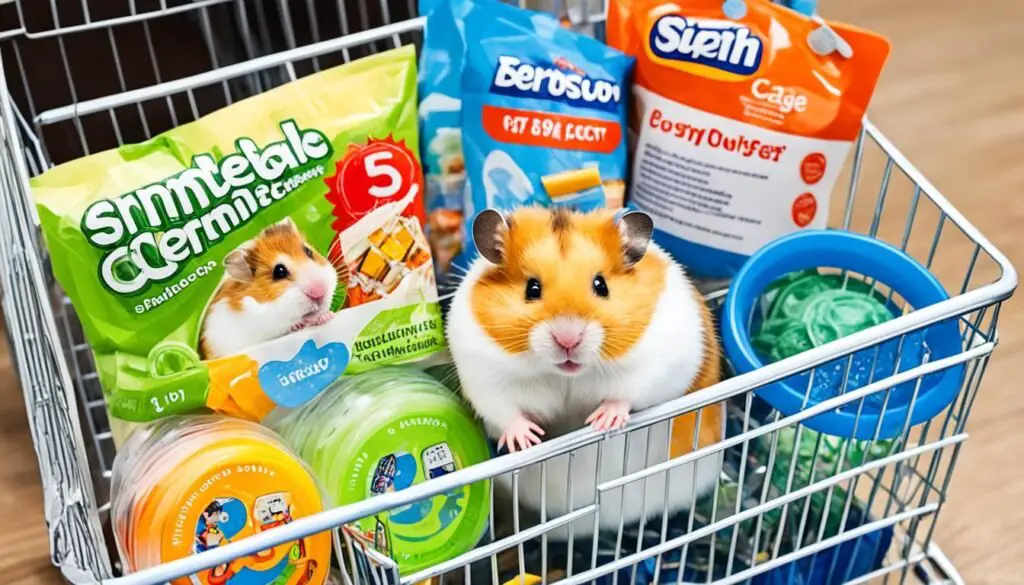Did you know that Syrian hamsters are one of the most popular small pets in the world? With their adorable looks and unique personalities, it’s no wonder why these furry companions have captured the hearts of pet lovers everywhere. If you’re considering adding a new member to your family, you may be wondering if Syrian hamsters are good pets. In this article, we’ll explore the joys and responsibilities of owning a Syrian hamster and provide you with all the information you need to make an informed decision. So, let’s dive in and discover why Syrian hamsters are such a popular pet choice.
What You Need to Know Before Getting a Syrian Hamster
Thinking of getting a Syrian hamster as a pet? Before you bring one home, it’s important to understand a few key things about these adorable little creatures. Here are some tips and insights to help you make an informed decision:
1. Solo Animals: Syrian hamsters are solitary animals and should never be kept in pairs or groups. They prefer to have their own space and can become stressed or aggressive if forced to live with other hamsters.
2. Nocturnal Nature: Keep in mind that Syrian hamsters are nocturnal, which means they are most active during the night. If you’re looking for a pet to be awake and active during the day, a Syrian hamster may not be the best choice for you.
3. Initial Skittishness: When you first bring your Syrian hamster home, they may be a bit skittish and timid. It’s important to be patient and consistent in handling them. Slowly introduce yourself and let them get used to your presence.
4. Gentle Handling: Syrian hamsters are sensitive to touch and should be handled gently. Avoid sudden movements or grasping them tightly, as this can cause them distress. Use gentle and slow motions when interacting with your hamster.
5. Building Trust: Regular and gentle handling can help build your Syrian hamster’s confidence and trust. Spend time interacting with them every day to develop a bond. Over time, they will become more comfortable and may even enjoy being held.
By keeping these tips in mind, you’ll be better prepared for the unique needs and behaviors of a Syrian hamster. Remember, owning a pet comes with responsibilities, so make sure you’re ready to provide the care and attention they require.
Syrian Hamsters as Great Companions
Syrian hamsters are not just adorable little creatures; they also make fantastic companions. With their individual personalities and affectionate nature, they can quickly become an important part of your family.
When you provide them with proper care and handling, Syrian hamsters can develop a strong bond with their owners. They will show their gratitude through their playful and active nature, constantly providing entertainment and companionship. Whether it’s watching them explore their habitat or interacting with them during playtime, these furry friends will keep you entertained and never fail to put a smile on your face.
Forming a bond with a Syrian hamster may take some time and patience, as each hamster is unique and may have different levels of trust and comfort. However, by spending quality time with your hamster, slowly gaining their trust, and providing gentle handling, you can establish a deep connection that will enrich both your lives.
To truly understand the joy of having a Syrian hamster as a companion, it’s important to experience it firsthand. Just look into those bright, curious eyes and see the love and loyalty they have to offer. They are truly one-of-a-kind pets that can bring immense happiness to your household.
So, if you’re looking for a small but delightful companion, consider welcoming a Syrian hamster into your life. They are sure to bring joy, love, and endless fun to your home.
Syrian Hamster Basic Needs
Syrian hamsters have specific needs that must be met for their overall well-being. Providing them with a suitable enclosure is crucial to their happiness and health. Choose a spacious cage or enclosure that allows them to move around freely. 
When it comes to bedding, opt for dust-extracted wood shavings or Carefresh bedding. These choices create a comfortable and safe environment for your hamster. The bedding also helps with their natural burrowing instincts, allowing them to create cozy sleep areas.
Proper nutrition is key to keeping Syrian hamsters healthy and thriving. Feed them a diet consisting of hamster lab blocks, which are specifically formulated to meet their nutritional needs. Supplement their diet with fresh fruits and vegetables for added variety and nutrition. Learn more about Syrian Hamster Diet and Nutrition.
For mental and physical stimulation, provide your hamster with a running wheel and toys. The running wheel allows them to exercise and burn off energy, while toys keep them entertained and engaged. This encourages natural behaviors and prevents boredom.
Handling and Taming Syrian Hamsters
Handling and taming Syrian hamsters requires a gentle and patient approach. When you first bring home your hamster, they may be jumpy and skittish, but with consistent and calm handling, they can become more comfortable with being held. Here are some tips to help you handle and tame your Syrian hamster:
- Wash your hands before handling your hamster. This will remove any food or strong scents that may provoke nibbling or biting. It’s important to create a positive and safe environment for your hamster.
- Gradually introduce handling sessions. Start with short periods of gentle contact, such as placing your hand in their cage without picking them up. As they become more comfortable, you can slowly progress to gently scooping them up.
- Avoid sudden movements. Swift movements can startle your hamster and make them fearful. Move slowly and calmly when handling them, helping them feel secure in your hands.
- Be patient. Syrian hamsters are naturally cautious animals, so it may take time for them to adjust to being handled. Don’t rush the process and give them the time they need to feel safe and comfortable.
Syrian Hamster Enclosure Requirements
Syrian hamsters are active animals and require a spacious enclosure to thrive. When it comes to hamster enclosure requirements, size matters. The minimum cage size for a Syrian hamster should be at least 1 foot by 2 feet, with a height of at least 1 foot. This will provide enough space for your hamster to move around comfortably and engage in natural behaviors.
When choosing a cage for your Syrian hamster, there are a few options to consider. Wire cages with a solid base allow for good ventilation and easy cleanup. Alternatively, glass or plastic aquariums with a mesh top can also be suitable, as long as there is proper airflow.
The key is to provide a secure and escape-proof enclosure that offers plenty of hiding spots for your hamster to retreat to. Hamsters love to burrow and dig, so make sure there is enough substrate in the cage for this purpose.
A suitable hamster wheel is essential for exercise, and it’s important to choose one that is appropriate for your Syrian hamster’s size. Ensure the wheel is large enough for their back to remain straight while running, as a small wheel can cause back problems.
Remember to regularly clean the enclosure to maintain hygiene and prevent unpleasant odors. By providing a well-suited and spacious home for your Syrian hamster, you are creating an environment in which they can thrive and be happy.
Syrian Hamster Diet and Nutrition
Proper nutrition is essential for the health and well-being of your Syrian hamster. Providing a balanced diet is key to ensuring they receive all the necessary nutrients. Here’s what you need to know about the syrian hamster diet and what to feed your furry friend.
Hamster Lab Blocks
Hamster lab blocks should form the foundation of your Syrian hamster’s diet. These specially formulated pellets are nutritionally complete and provide the necessary vitamins and minerals. They help ensure that your hamster receives a well-rounded diet.
Fruits and Vegetables
In addition to hamster lab blocks, you can offer small amounts of fresh fruits and vegetables as a supplement. Some suitable options include apples, carrots, broccoli, and cucumbers. However, it’s important to remember that fruits and vegetables should only make up a small portion of your hamster’s diet.
Protein Sources
Syrian hamsters need occasional protein sources in their diet. Hardboiled eggs or feeder insects like mealworms or crickets can be offered as treats. However, it’s important not to overfeed protein sources, as they should only be provided in small quantities.
Feeding Tips
When offering fresh food to your Syrian hamster, use separate dishes and remove any uneaten food within a few hours to prevent spoilage. Fresh, clean water should always be available in a water bottle or dish that is changed regularly. Remember to check the water supply daily to ensure it hasn’t run out.
Providing a balanced and varied diet is crucial for maintaining your Syrian hamster’s health. By following these guidelines, you can ensure that your furry friend receives the proper nutrition they need to thrive.
Syrian Hamster Health and Maintenance
Syrian hamsters are generally hardy animals, but it is important to be aware of their health needs to ensure their well-being. Although they are known for their robust nature, they can still experience certain health issues. By understanding common health concerns and implementing proper maintenance practices, you can help keep your Syrian hamster healthy and happy.
One common health issue in Syrian hamsters is wet tail. Wet tail is a gastrointestinal infection that can be caused by stress, unsanitary conditions, or improper diet. It is characterized by wetness around the tail area, diarrhea, and a lack of appetite. Wet tail can be life-threatening, and immediate veterinary attention is required if you notice these symptoms.
Regular dental care is also essential for Syrian hamsters. Their teeth continuously grow throughout their lives, and if not properly worn down, they can become overgrown. Overgrown teeth can lead to difficulty eating, mouth ulcers, and pain. Providing appropriate chewing toys and inspecting your hamster’s teeth regularly can help prevent dental issues.
Another aspect of Syrian hamster health and maintenance is ensuring a clean and comfortable living environment. Quality bedding is crucial for their well-being. Dust-extracted wood shavings or Carefresh bedding are excellent options that provide comfort and absorb moisture. Regular cleaning of the enclosure and changing the bedding will help prevent the buildup of bacteria and parasites.
Where to Get a Syrian Hamster
When it comes to adding a Syrian hamster to your family, you might be wondering where to get one. While pet shops do offer Syrian hamsters for sale, it is recommended to consider finding a reputable breeder or rescue organization.
A reputable breeder or rescue organization can provide you with a well-cared-for hamster and offer valuable information about its health history. By choosing a reliable source, you can have peace of mind knowing that the hamster you bring home has received proper care and attention.
Buying from a breeder or adopting from a rescue organization also gives you the opportunity to support responsible hamster breeding practices and animal welfare.
Prices for Syrian hamsters may vary depending on factors such as their age and coloring. It’s worth considering your budget and doing some research to find the best option that fits your needs and preferences.
Syrian Hamster Care Costs
When considering getting a Syrian hamster as a pet, it’s crucial to budget for their care costs. While they are relatively low-maintenance pets, there are still expenses to consider.
The main costs associated with caring for a Syrian hamster include their food and bedding. It is important to provide them with quality hamster food for their nutritional needs. Additionally, they require suitable bedding, such as dust-extracted wood shavings or Carefresh, to create a comfortable and clean environment.
On average, you should budget around $20 to $40 per month for these supplies. Keep in mind that the exact costs may vary depending on the brand and type of food and bedding you choose.
Aside from the basic supplies, you should also consider the cost of annual veterinary checkups and potential emergency medical expenses. Regular vet visits are essential to ensure your hamster’s overall health and well-being. In case of any unexpected health issues or emergencies, it is important to have a financial plan in place to cover the costs.
Remember, the cost of caring for a Syrian hamster is a long-term commitment. While they may not have extensive care expenses compared to other pets, it is still essential to budget and plan accordingly to provide them with the best care possible.

Conclusion
After exploring the world of Syrian hamsters as pets, it is clear that they can be wonderful companions for individuals or families who are willing to provide the proper care. These furry little creatures have the ability to offer companionship, entertainment, and a unique bond with their owners. By understanding their specific needs and investing time and effort into their care, Syrian hamsters have the potential to bring endless joy and happiness to your home.
From providing hours of entertainment with their active and playful nature to forming a deep bond with their owners, Syrian hamsters have proven to be delightful pets. Their individual personalities and their ability to become attached make them a great choice for those seeking a small and manageable pet.
However, it’s important to remember that owning a Syrian hamster comes with responsibilities. Regular attention to their enclosure, food, and overall health is crucial to ensure their well-being. By following the proper guidelines and seeking the advice of veterinarians when necessary, you can give your Syrian hamster the best possible care.
